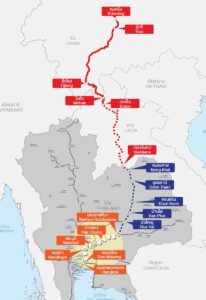 Transport Ministry’s update on progress of the Thai-Chinese High-Speed Rail Project
Transport Ministry’s update on progress of the Thai-Chinese High-Speed Rail Project
Surapong Piyachote, Deputy Minister of Transport, has provided updates on the progress of the Thai-Chinese High-Speed Rail Project, covering both Phase 1 and Phase 2.
Phase 1 (Bangkok-Nakhon Ratchasima): This phase spans 250.8 kilometers with a budget of 179.4 billion baht.
Of the 14 civil engineering contracts, two remain unstarted: Contracts 4-5, which involve the Ban Pho to Phra Kaeo segment and issues related to Ayutthaya Station. Finalization of these contracts is expected by October 2024, pending new government approvals.
The State Railway of Thailand (SRT) has completed a Heritage Impact Assessment for Ayutthaya. Adjustments, such as reducing the structure’s height, have been made to comply with UNESCO guidelines.
The route remains 1.5 kilometers from the World Heritage Site to ensure minimal impact.
The project will proceed as planned without rerouting, as changing the route would significantly increase costs and extend the timeline by 10 years.
For Contracts 4-5, the SRT has approved Boochai Panich (1979) to construct the route first, with station work deferred.
For Contract 4-1 (Bang Sue to Don Mueang), which shares infrastructure with the high-speed rail connecting three airports, the speed has been reduced to 160 km/h. CP Group’s Asia Era One is managing construction, with a resolution expected soon.
Contract 3-2 (Muak Lek and Lam Takong Tunnels) is ahead of schedule, with 70% completion compared to the planned 50%.
Delays in other contracts due to liquidity issues will be addressed, and construction is targeted for completion by early 2028. Testing will follow, with the first phase opening in mid-2028.
Phase 2 (Nakhon Ratchasima-Nong Khai): This phase covers 357.1 kilometers with a budget of 341.4 billion baht.
After policy announcements, the project will be presented to the Cabinet, with civil engineering expected to finish by 2029.
A budget of 10 million baht in 2025 will be allocated for consulting on operational models, aiming for a clear plan by March 2025.
A public-private partnership model is likely for management and maintenance.
Source: Thai Enquirer on twitter


